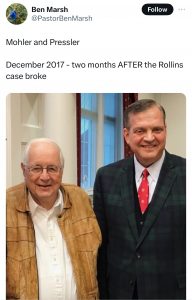Poor Al Mohler. He’s Paul Pressler’s latest victim.
“How can that be?” you ask. “Nobody has enjoyed Southern Baptist Convention prominence as famously and magnificently as Al Mohler.”
That’s true, of course. Mohler came along at just the right time to capitalize on the SBC’s conservative resurgence/fundamentalist takeover. In the 1980s, with conservatives’ momentum building toward convention control, Mohler earned master of divinity and Ph.D. degrees from Southern Baptist Theological Seminary. Simultaneously, he also worked as an assistant to the seminary’s president, Roy Honeycutt, meeting power brokers and other rising stars from across the SBC and building his personal network of allies.

Marv Knox
A few years later, with a smidge of denominational experience — a brief stint as editor of Georgia Baptists’ Christian Index — Mohler landed right place/right time to succeed Honeycutt as president of his alma mater, the SBC’s oldest seminary. Mohler was only 33 years old.
Across the past three decades, Mohler has burnished his reputation as the SBC’s most powerful kingmaker, towering intellect and famous evangelical pundit. His “tree” of mentored seminary presidents and professors, denominational leaders and prominent pastors is taller than anybody’s. He’s built Southern Seminary into the SBC’s flagship school while prolifically publishing books and papers. And his podcasts and public speaking engagements have made “Albert Mohler” a household name far beyond the SBC.
How, you ask, has Mohler fallen victim to Pressler, once co-architect of the conservative resurgence but now a credibly and repeatedly accused abuser of teenage boys and young men?
Well, aside from whatever they do physically, predators typically abuse their victims in two ways. They strip them of their dignity. And they steal whatever the victim values most — often their reputation with family, friends and people they admire.
Lately, 93-year-old Pressler has done just that to Mohler.
Weak logic
During Feb. 16 forum in Louisville, Mohler stretched credulity beyond its limits, bending over backward to defend his old friend. While doing so, he applied logic so weak it wouldn’t earn a passing grade at his seminary across town. Nearing the end of his esteemed career, nobody ever again is likely to think Mohler is the smartest guy in the room, a devastating loss for the prince of SBC seminary presidents.
“He applied logic so weak it wouldn’t earn a passing grade at his seminary.”
Here’s what happened:
At the forum, sponsored by the Kenwood Institute in Louisville, Mohler said the sexual abuse allegations against Pressler are “so horrifying that it’s actually very hard to imagine that they could be real.” Give Mohler credit for acknowledging the charges against Pressler are “horrifying.” But he immediately engages in a primary pathology of victimhood — denial.
Mohler lacks the imagination — or perhaps moral clarity — to admit charges of Pressler’s sexual abuse of teen boys and young men could be true.
The facts
Mohler’s denial aside, the charges are substantive and have been delivered under oath.
Late last year, the Southern Baptist Convention — which owns Southern Seminary — and its top administrative body, the Executive Committee, agreed to a confidential settlement in a lawsuit accusing Pressler of sexually abusing a teenage member of his Houston church multiple times, beginning in 1977.
The lawsuit had hung over the SBC’s and Executive Committee’s heads since 2017. That’s when Duane Rollins filed the legal action, accusing Pressler of molesting him numerous times across years. Rollins said the sexual assaults began when he was 14 years old, after he enrolled in a Bible study led by Pressler.
In breaking the story about the lawsuit settlement, the Texas Tribune reported, “As part of Rollins’ suit, at least seven other men came forward with their own allegations of sexual misconduct by Pressler in incidents spanning four decades.”
An Executive Committee statement provided to the Tribune said the agency was “fully prepared” to go to trial. But “several factors ultimately made settlement the more prudent choice.” Among them was “the likelihood that counsel for the SBC and Executive Committee would have to confront and cross-examine abuse survivors.”
Catch the Executive Committee’s tacit agreement with the lawsuit’s claims: Its attorneys might have to “confront and cross-examine abuse survivors.” Not merely “witnesses” or “alleged abuse survivors,” but “abuse survivors,” period. Although Pressler has denied charges against him, the SBC’s/Executive Committee’s attorneys have reason to believe he has left “abuse survivors” in his wake.
As reported by the Tribune, the Rollins lawsuit alleges Pressler’s predation dates back at least to 1977.
As reported by the Tribune, the Rollins lawsuit alleges Pressler’s predation dates back at least to 1977. That’s when a former member of Pressler’s youth group in a Houston Presbyterian church said Pressler molested him in a country club sauna. That charge resulted in the church removing Pressler from his position working with youth, as well as his move to First Baptist Church in Houston.
Twenty-seven years later, in 2004, leaders at First Baptist in Houston received an allegation that Pressler undressed and groped a young man in Pressler’s home, according to information revealed in the Rollins lawsuit. In a letter, the church leaders condemned Pressler’s “morally and spiritually” inappropriate behavior. But they also feared going public, lest the news damage Pressler’s reputation in both the church and the SBC.
This background is important because it sheds light on the breadth and depth of Mohler’s denial.
Deny, deflect
In an hour-long interview conducted at the Kenwood Institute forum, Mohler called news coming out of the Rollins lawsuit “a massive scandal related to someone who had a lot of influence on the Southern Baptist Convention.” He agreed the charges against Pressler are “humiliating to the Southern Baptist Convention.”
But Mohler quickly turned to denial. “I can’t figure this out,” he said. “And I’ll admit it because you’re talking about a man, Paul Pressler, who’s lived a very public life and who had many enemies.”
“Here’s where Mohler’s logic gets silly.”
Here’s where Mohler’s logic gets silly: Since those “enemies” didn’t come forward with allegations of Pressler’s sexual abuse, it could not have happened.
He specifically cited the late Ken Chafin, a moderate SBC leader and pastor of South Main Baptist Church in Houston in the days of Pressler’s rise to prominence and then dominance of SBC politics. Pressler also lives in Houston.
“It’s hard for me to believe that someone like a Ken Chafin … it’s just hard for me to imagine that if he knew or had heard a rumor or anything that it just wouldn’t have been addressed. I just find that implausible,” Mohler said.
So, let’s follow Mohler’s logic: If (a) Chafin were Pressler’s enemy, and (b) an enemy would use any damaging material to hurt his adversary, then (c) because Chafin never publicly accused Pressler of sexual abuse, (d) Pressler therefore is innocent of sexually preying upon teenagers and young men who have sworn in court he abused them.
Poor Mohler. He’s debasing himself by throwing a long-dead “enemy” under the proverbial bus. Chafin, who cannot speak for himself, much less defend himself, is his foil. That cheap shot should be beneath the dignity of an esteemed seminary president/denominational statesman. But Pressler’s pull on Mohler has sucked him down to gutter fighting with a dead guy.
“Pressler’s pull on Mohler has sucked him down to gutter fighting with a dead guy.”
And poor Mohler. His nothing-happened-because-Chafin-didn’t-say-anything logic would get a big, fat “F” in any test of critical thinking over at Southern Seminary.
Unraveling the lie
Two responses:
First, just because Chafin didn’t know about it doesn’t mean Pressler didn’t do it. Predators abuse victims in private and work hard to keep their misdeeds secret. According to victims’ allegations, Pressler abused them in his home, at his ranch and in empty saunas, not on the steps of South Main Baptist Church.
Second, Mohler applied SBC conservatives’ ethics to a deeply moral moderate pastor. Pressler and his allies won SBC political battles by lying about seminary professors, other denominational workers and moderate pastors. Long before the era of Trump, facts didn’t matter for them. The end justified the meanness. But Chafin, marked by integrity, would not diminish his character that way. We do not know what he knew — he’s dead and can’t respond — but those of us who knew him know he would not make charges he could not document. He practiced ethics.

Al Mohler posing with Paul Pressler two months after the Duane Rollins case against Pressler was made public in 2017. (Via X)
Also, Mohler’s implication that SBC conservatives would have believed Chafin if he claimed Pressler were an abuser is outright bogus. They didn’t believe him when he told them, with ample evidence, moderates love Jesus and believe the Bible. Why would they believe their political leader preyed on boys and young men?
And speaking of what was known, Mohler told the Louisville crowd he didn’t know about Pressler’s alleged abuses prior to 2017, when Rollins filed his lawsuit and news sources reported the charges.
“I think probably to most of us, it wasn’t known to me that there was a background of some previous documentation” of alleged abuses, Mohler said. That statement may technically be correct; he used the word “documentation.” But he didn’t know the “background” of claims about Pressler’s proclivities?
That’s a fascinating statement, because rumors of Pressler’s abuse abounded in the SBC at least as far back as 35 years ago — when Mohler held an insider job as editor of the Christian Index and continued to manage the convention-insider network he built while working for Roy Honeycutt.
Thirty-five years ago, in 1989, then-President George H.W. Bush nominated Pressler to direct the U.S. Office of Government Ethics. The nomination led to an FBI background investigation, in which agents interviewed leaders from across the breadth of the SBC and presumably similar community leaders in Houston.
After the investigation, President Bush ultimately announced, “Unfortunately, Judge Pressler informs me that due to professional, religious and family obligations, he is unable to accept a full-time government position at this time.”
That was the official, graceful announcement. But the SBC was abuzz with questions about why, people wondered, Pressler failed that FBI background check. Did agents (a) find substantial evidence regarding Pressler’s rumored relationships with teenagers and young men, (b) realize lots of people just couldn’t stand the guy or (c) all the above?
“Owning up to moral failure by the leaders who got them there … would undermine their belief that they received the SBC through the merited favor of God.”
I was an editor at Baptist Press at the time and wrote the article about the Office of Government Ethics. In response to a question, an FBI agent involved with the investigation said the bureau’s report cannot be released until either Pressler waives his right to privacy or he dies.
But Mohler denied knowing the “background” of Pressler’s abuse allegations until the Rollins suit came out in 2017. To paraphrase Jesus: “Which is easier: Tell a whopper or say, ‘I was wrong’?”
SBC conservatives can’t admit they were wrong
Mohler isn’t standing alone, of course. No SBC agency head, officer or other prominent leader — past or present — has condemned Pressler. Given their theological worldview, they can’t.
They built their movement to control the SBC on the notion God blessed them because they are righteous. The “liberals” were “godless,” so the Lord handed the SBC over to them for safekeeping. They got the SBC because they earned it.
So, owning up to moral failure by the leaders who got them there — Paige Patterson’s misogyny and failure to protect female seminarians from sexual abuse and the lawsuit and related accusations regarding Pressler’s sexual abuse — would undermine their belief that they received the SBC through the merited favor of God.
Pressler is old, and Mohler is prominent. But Mohler’s indefensible defense of Pressler reveals this saga involves one more victim than everyone thought.
Marv Knox founded Fellowship Southwest after editing the Baptist Standard almost 20 years. He previously served as features editor for Baptist Press and as editor of the Kentucky Western Recorder. Now retired, he lives with his wife, Joanna, in Durham, N.C., where he tries to do something useful almost every day. Sometimes, that’s writing for BNG.
Related articles:
What the SBC should do about its most famous accused sexual abuser | Opinion by Marv Knox
Mohler says he finds it hard to believe allegations against Pressler are true
Confidential settlement reached in Pressler sexual abuse case


